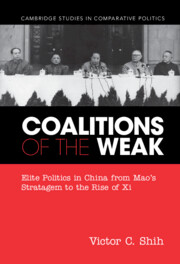Book contents
- Coalitions of the Weak
- Cambridge Studies in Comparative Politics
- Coalitions of the Weak
- Copyright page
- Dedication
- Contents
- Figures
- Tables
- Acknowledgments
- 1 Introduction
- 2 Coalition of the Strong
- 3 “Counterrevolutionary Splittists” in Mao’s Ruling Coalition
- 4 The Scribblers Mafia
- 5 Realizing the Coalition of the Weak
- 6 The Collapse of the Coalition of the Weak and Power Sharing in the 1980s
- 7 Weak Successors
- 8 Conclusion and the Future of the Chinese Communist Party
- References
- Index
8 - Conclusion and the Future of the Chinese Communist Party
Published online by Cambridge University Press: 26 May 2022
- Coalitions of the Weak
- Cambridge Studies in Comparative Politics
- Coalitions of the Weak
- Copyright page
- Dedication
- Contents
- Figures
- Tables
- Acknowledgments
- 1 Introduction
- 2 Coalition of the Strong
- 3 “Counterrevolutionary Splittists” in Mao’s Ruling Coalition
- 4 The Scribblers Mafia
- 5 Realizing the Coalition of the Weak
- 6 The Collapse of the Coalition of the Weak and Power Sharing in the 1980s
- 7 Weak Successors
- 8 Conclusion and the Future of the Chinese Communist Party
- References
- Index
Summary
Authoritarian regimes must grapple with a fundamental source of instability that a significant redistribution of power, often unseen or only partially observed, can radically alter the incentives of regime insiders and overturn initially stable equilibria (Acemoglu et al. 2008). Although institutional features such as authoritarian legislatures and a ruling party can alleviate the incentives to usurp the incumbent leader to some extent, especially among lower-level officials (Gandhi 2008; Svolik 2012), they cannot fundamentally remove the incentives to grab power forcefully in the top echelon of these regimes. For one, one-party states by design entrust enormous power in the hands of the top few officials or even in the hands of one person. For ambitious officials just one layer below the very top facing a low probability of ordinary promotion, the reward for achieving an extra step upward can be enormous and can justify a risky gamble, especially if an external shock leads to a significant redistribution of power. Even for those who are already in the top echelon of the ruling party, a gamble to break the existing power-sharing equilibrium can reap enormous rewards as the power and resources of authoritarian colleagues are consolidated into one’s hands. Knowing the dangers of these possibilities, authoritarian leaders also have the incentives to preempt potentially threatening colleagues by removing them from power with coercive measures. In the absence of credible constitutional frameworks or electoral pressure to stop the actions of the top leadership, the stable façade of authoritarian politics can quickly descend into coups, purges, and assassinations.
Keywords
- Type
- Chapter
- Information
- Coalitions of the Weak , pp. 185 - 200Publisher: Cambridge University PressPrint publication year: 2022

